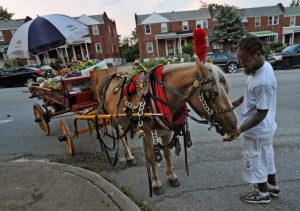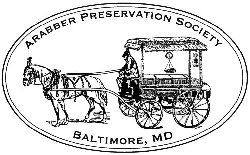In Horses in Cities: Part I I wrote about the on going debate for the place of horse carriages in metropolitan areas such as New York City, Chicago, and Philadelphia. Similar to that discussion is the argument over Arabbers in Baltimore. Arabbers are merchants who travel door-to-door selling fresh produce that is pulled by a horse and wagon. Arabbers have been part of Baltimore’s history for over 100 years. The carts have developed a base of frequent costumers, many of whom are senior citizens who cannot travel to grocery stores as often as they might like. This convenience and historical significance make powerful cases for maintaining place Arabbers on city streets.
Much like the debate in NYC, these horse driven wagons came under fire from animal rights activists who claimed that stabling conditions for horses were inhumane. Stables housing horses have been shut down due to building code violations and accusations of mistreatment. I agree current stabling is in poor condition and definitely needs replacement but that does not justify the removal of the Arabbers from the street. They play an important and integral part of the inner city community. Daniel Van Allen is the president and founder of the Arabber Preservation Society and has been at the forefront of the effort to keep Arabbers on Baltimore’s streets. In 2013, the APS added new stalls and renovated old stalls at the Arabber Center and released 8 new carriages to operate in Baltimore. It is a step in the right direction and like many good causes they need funding, donations, grants, etc.
It is interesting to compare the use of horses in NYC to those in Baltimore. Generally conditions in Baltimore are not as tough as those in NYC. My argument against horse carriages in NYC is their use on busy congested city streets, their standing long hours on hard surfaces waiting for a customer and their questionable stabling situation. Arabber horses are typically used in residential areas and not high traffic areas, which the horses in NYC encounter. They provide a useful service to the poor communities of the inner city and employ the use of horses in a traditional way. For these reasons, we are hoping to work with the Arabbers in Baltimore to provide them decent stabling and a museum about the history of the Arabbers. Our goal in that effort is to provide them safe healthy stabling and care at the same time we preserve inner city heritage, jobs and provide a community service.
I support preservation of our historic heritage especially when it serves as a useful community service (food services to the poor inner city neighborhoods) as in the case of the Arabbers and independent employment to members of the community. There are a lot of other efforts (community farming, farmers markets, community supported not for profit groceries and buyers clubs, etc) being made today to provide quality food to the under served communities of the inner city. Arabbers are a part of this service and while they predate many of the newer ones, they are an initiative worth protecting and preserving.
Are you interested in learning more or getting involved with Arabber preservation?
- Read more about Arabbers
- Join the Initiative
- Join Mailing List

